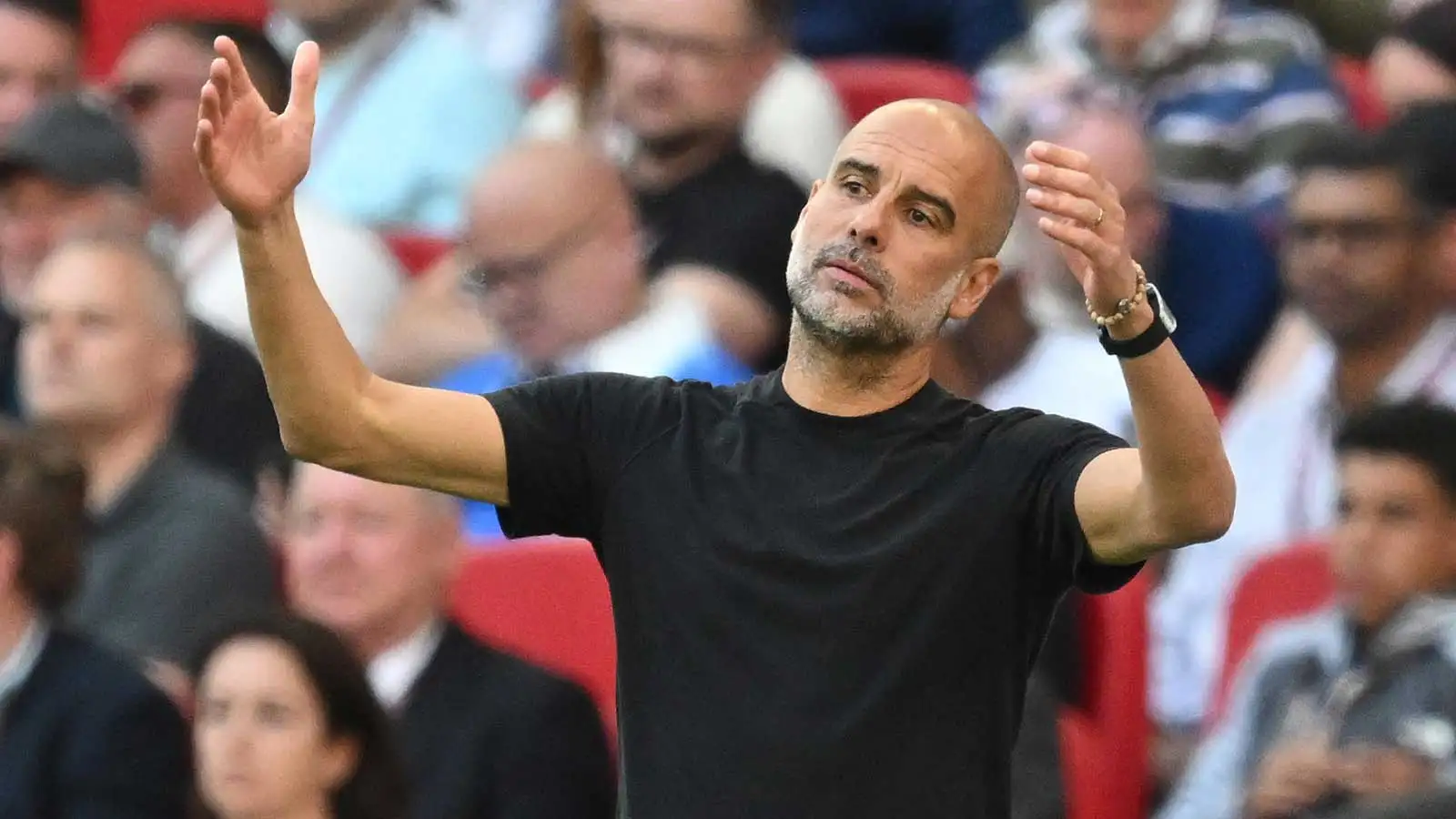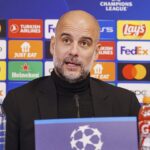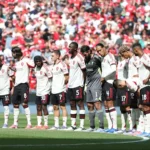Man City should immediately sell £43m star who lost the ball nine times vs Crystal Palace in the FA Cup final

Manchester City’s 1-0 defeat to Crystal Palace in the FA Cup final at Wembley Stadium on May 18, 2025, served as a stark reminder of how far the once-dominant Sky Blues have fallen from their previous heights. The loss was not merely a disappointment; it was a clarion call for fundamental changes to a squad that has become increasingly disconnected from the relentless standards that once made them the envy of world football.
In the harsh glare of Wembley’s floodlights, the limitations of Pep Guardiola’s current squad were laid bare for all to see. The creative burden fell almost entirely on the shoulders of Kevin De Bruyne, while the team’s overall lack of athleticism and dynamism became painfully apparent against a Palace side that matched their intensity and exceeded their desire. This performance crystallized what many observers had suspected throughout the season: Manchester City’s golden era may be drawing to a close, and difficult decisions about beloved players must be made.
Among the most contentious of these decisions concerns Bernardo Silva, the Portuguese maestro who arrived at the Etihad Stadium in 2017 for £43 million and has since become synonymous with City’s success. However, his performance against Palace, where he lost possession nine times despite completing 92% of his passes, encapsulated the broader issues plaguing both the player and the team. The time has come to consider whether Silva’s legendary status should shield him from the harsh realities of modern football’s unforgiving nature.
The Golden Years: Bernardo Silva’s Peak Performance
To understand the magnitude of the decision facing Manchester City, it’s essential to acknowledge what Bernardo Silva represented during his peak years. The diminutive Portuguese international was the epitome of Guardiola’s philosophy: technically gifted, tactically intelligent, and possessed of an engine that seemed to run on pure determination rather than fuel.
Silva’s best years at City, roughly spanning from 2017 to 2022, saw him operate as one of the Premier League’s most versatile and effective players. His ability to seamlessly transition between roles – whether as an orthodox winger, an inverted wide midfielder, or a central playmaker – made him invaluable to Guardiola’s tactical schemes. The Portuguese international’s quick feet, close ball control, and ability to operate in tight spaces made him the perfect embodiment of City’s possession-based approach.
During the treble-winning 2022-23 season, Silva was instrumental in City’s success across all competitions. His performances in crucial moments, including his contributions in the Champions League knockout stages, demonstrated his ability to rise to the occasion when it mattered most. The six Premier League titles he has won with City stand as testament to his consistency and importance to the team’s success over nearly a decade.
Silva’s tactical intelligence has always been his greatest asset. His understanding of when to press, when to drop deep, and when to make forward runs has been second to none throughout his career. This footballing IQ, combined with his technical ability, made him one of Guardiola’s most trusted lieutenants and a player capable of influencing games in multiple ways.
The Decline: Physical Limitations and Tactical Evolution
However, even the most gifted players cannot escape the inexorable march of time, and Silva’s recent performances suggest that age has begun to take its toll. At 30 years old, the Portuguese international no longer possesses the explosive acceleration and tireless running that once made him such a potent weapon in City’s arsenal.
The signs of decline have been subtle but increasingly apparent over the past two seasons. Where Silva once glided past defenders with ease, he now finds himself more easily dispossessed. His trademark pressing game, which once saw him harrying opponents into submission across the entire pitch, has become less intense and less effective. The numbers from the Palace defeat – nine possessions lost, zero key passes, and a generally ineffective display despite high pass completion rates – tell the story of a player whose physical capabilities no longer match his mental acuity.
This decline is not merely about raw pace or stamina; it’s about the split-second timing that separates good players from great ones. Silva’s first touch, while still technically sound, lacks the immediate control that once allowed him to escape pressure situations effortlessly. His ability to change direction quickly, crucial for a player of his size and playing style, has diminished to the point where opponents can now anticipate and counter his movements more effectively.
The tactical evolution of the Premier League has also worked against Silva. The modern game demands increasingly athletic and dynamic players, particularly in the midfield areas where Silva has predominantly operated in recent seasons. Teams have become more organized defensively, space has become more premium, and the physical demands of the position have intensified. These changes have exposed the limitations of an aging Silva more acutely than they might have in previous eras.
Financial Considerations and Market Value
From a purely business perspective, the decision to sell Silva becomes even more compelling when considering Manchester City’s financial position and the player’s current market value. With only one year remaining on his contract, City face the prospect of losing Silva on a free transfer in 2026 if they fail to act decisively this summer.
The Portuguese international’s declining market value represents a significant concern for City’s financial planning. While Silva commanded interest from top European clubs just two years ago, his age and recent form have undoubtedly impacted his transfer value. City’s initial £43 million investment may never be fully recouped, but waiting another year would likely result in an even greater financial loss.
Furthermore, Silva’s wages represent a significant burden on City’s wage structure. As one of the club’s highest earners, his departure would free up substantial resources that could be redirected toward younger, more dynamic players who better fit Guardiola’s evolving tactical needs. The financial flexibility gained from Silva’s sale could prove crucial in City’s efforts to rebuild and rejuvenate their squad.
The concept of depreciation in football is brutal but unavoidable. Silva, like all players, is a depreciating asset whose value decreases with age and declining performance levels. City’s failure to capitalize on his market value during his peak years means they now face the difficult task of extracting maximum value from a player whose best days are clearly behind him.
Tactical Limitations in Modern Manchester City
Guardiola’s tactical evolution at Manchester City has increasingly emphasized pace, pressing intensity, and positional versatility – qualities that the current version of Silva struggles to provide consistently. The Portuguese’s preferred role as a central midfielder requires attributes he no longer possesses to the same degree, while his effectiveness on the flanks has diminished due to his reduced pace and dribbling ability.
The Palace defeat highlighted these tactical limitations starkly. Deployed as a defensive midfielder, Silva struggled to impose himself on the game, failing to provide the dynamism and ball-carrying ability that Guardiola’s system requires from that position. His nine possession losses came at crucial moments, disrupting City’s rhythm and allowing Palace to establish their defensive shape more effectively.
Modern football’s emphasis on rapid transitions between defense and attack has left Silva looking increasingly ponderous. Where once his measured approach to the game was an asset, it now appears sluggish compared to the rapid-fire decision-making required in today’s elite football. His inability to drive forward with the ball or create immediate attacking threats has become a significant limitation in City’s tactical arsenal.
The pressing game that has been central to Guardiola’s philosophy also depends heavily on coordinated, high-intensity movement from all players. Silva’s reduced mobility and stamina have made him a potential weak link in City’s pressing structure, allowing opponents to identify and exploit the spaces he can no longer cover effectively.
The Replacement Strategy: Tijjani Reijnders
Manchester City’s interest in AC Milan’s Tijjani Reijnders represents a clear indication of the direction Guardiola wants to take the team. The Dutch international embodies everything that Silva once provided but can no longer deliver: pace, stamina, technical ability, and the tactical flexibility to operate across multiple positions.
Reijnders, at 26, represents the perfect age profile for City’s rebuild. Young enough to have his best years ahead of him, but experienced enough to make an immediate impact, he offers the kind of long-term solution that Silva can no longer provide. His performances for Milan have demonstrated his ability to operate at the highest level, while his versatility mirrors the multi-positional capability that made Silva so valuable during his peak years.
The Dutch midfielder’s style of play suggests he could seamlessly integrate into Guardiola’s tactical system. His ability to carry the ball forward, create chances for teammates, and contribute defensively makes him an ideal candidate to fill the void left by Silva’s departure. Moreover, his age means he could serve as the foundation of City’s midfield for the next five to six years, providing the kind of stability and continuity that has been lacking in recent seasons.
From a financial perspective, investing in Reijnders makes considerable sense. While the transfer fee would be substantial, the long-term value provided by a player entering his prime years far exceeds the diminishing returns offered by retaining an aging Silva for another season.
The Broader Context: City’s Squad Rebuild
Silva’s potential departure cannot be viewed in isolation but rather as part of a broader reconstruction project that Manchester City must undertake to remain competitive at the highest level. The Palace defeat exposed systemic issues throughout the squad, from the lack of creativity beyond De Bruyne to the general absence of pace and athleticism across multiple positions.
The reality that Kevin De Bruyne is being courted by Chicago Fire serves as another stark reminder of the squad’s aging profile. With several key players in their thirties, City face the challenge of refreshing their squad while maintaining the winning culture that has defined the Guardiola era. Silva’s departure, while emotionally difficult, would represent an important step toward this necessary renewal.
City’s recent transfer activity suggests they recognize the need for change, but the scale of the rebuild required means difficult decisions about beloved players are inevitable. The club’s ability to remain competitive depends on their willingness to make these tough choices before sentiment overrides strategic thinking.
The Premier League’s competitive landscape has also shifted dramatically. Liverpool and Arsenal’s resurgence has created a more challenging environment where marginal gains matter more than ever. City’s margin for error has decreased significantly, making the retention of declining players increasingly costly in terms of lost opportunities and competitive advantage.
Performance Analysis: The Numbers Don’t Lie
A detailed examination of Silva’s recent performances reveals a concerning pattern of decline that extends beyond the Palace defeat. While his pass completion rates remain high, the impact and significance of his contributions have diminished markedly. His ability to create chances, drive forward with the ball, and influence games in crucial moments has waned considerably.
The statistics from the Palace game – 59 accurate passes from 64 attempts (92%), nine possessions lost, three duels won from five, zero key passes, and being dribbled past once – paint a picture of a player who, while maintaining basic technical competence, lacks the dynamism to influence games at the highest level. These numbers become even more telling when compared to his peak performance metrics from previous seasons.
Silva’s heat maps from recent games show a player increasingly confined to deeper positions, suggesting either tactical instruction or physical limitation prevents him from contributing in advanced areas. His reduced involvement in the final third represents a significant departure from his traditional role and effectiveness.
The eye test supports what the statistics suggest: Silva appears a step slower, less incisive, and more cautious than in previous seasons. His decision-making, while still generally sound, lacks the boldness and creativity that once made him such a dangerous player. These observable changes, combined with the numerical evidence, create a compelling case for his departure.
The Emotional Factor: Legend Status vs. Pragmatism
Perhaps the most challenging aspect of the Silva situation is balancing emotional attachment with practical necessity. The Portuguese international has been integral to City’s success over nearly eight years, contributing to six Premier League titles and numerous other trophies. His commitment to the club and his professionalism have never been questioned, making the prospect of his departure particularly painful for supporters and management alike.
Silva’s own comments about hoping to continue winning trophies at City demonstrate his desire to remain at the club. However, his personal aspirations must be weighed against the team’s collective needs and long-term prospects. The harsh reality of elite football is that past achievements, while worthy of recognition and gratitude, cannot guarantee future opportunities.
Guardiola’s evident fondness for Silva adds another layer of complexity to the situation. The Spanish manager’s comments about the player’s commitment and quality reflect genuine appreciation for Silva’s contributions. However, Guardiola’s primary responsibility is to the team’s success, not individual players’ feelings or legacy considerations.
The club must navigate this emotional minefield carefully, ensuring that Silva’s departure, if it occurs, is handled with the respect and dignity befitting his contributions. The manner of his exit could significantly impact both his personal legacy and the club’s reputation for treating loyal servants appropriately.
Market Dynamics and Transfer Strategy
The current transfer market presents both opportunities and challenges for Manchester City regarding Silva’s potential sale. While his age and recent form may limit interest from top-tier clubs, several factors work in City’s favor when considering his marketability.
Silva’s reputation and trophy collection make him an attractive proposition for clubs seeking experienced winners. His technical ability, while diminished, remains at a level that could benefit teams operating slightly below the Premier League’s absolute elite. Clubs looking to add leadership and winning mentality to their squads might view Silva as an ideal short-term acquisition.
The Portuguese connection could prove valuable in facilitating a move. Silva’s international experience and reputation in Portugal might attract interest from clubs like Porto or Benfica, who could offer him the opportunity to return home while providing City with a reasonable transfer fee.
Additionally, Major League Soccer clubs have shown increasing interest in acquiring established European players, and Silva’s profile fits perfectly with their typical recruitment strategy. While such a move might not yield the highest transfer fee, it would provide Silva with an attractive lifestyle option while generating funds for City’s rebuilding efforts.
Conclusion: A Necessary Evolution
The decision facing Manchester City regarding Bernardo Silva transcends simple tactical considerations or financial calculations. It represents a fundamental question about the club’s philosophy and willingness to evolve with the changing demands of elite football. While Silva’s contributions to City’s success cannot be overstated, his current limitations suggest that his time as a key player at the highest level may be drawing to a close.
The FA Cup final defeat to Crystal Palace served as a wake-up call, highlighting the urgent need for squad renewal and the dangers of sentimentality in professional football. Silva’s performance in that game, characterized by lost possession and limited impact, symbolized the broader challenges facing an aging City squad that must adapt or risk irrelevance.
From every conceivable angle – tactical, financial, and strategic – the case for Silva’s departure appears compelling. His sale would generate funds for reinvestment, clear space for younger players to develop, and signal City’s commitment to maintaining their competitive edge. The potential acquisition of players like Tijjani Reijnders represents the kind of forward-thinking recruitment that has previously served City well.
The emotional difficulty of parting with a club legend should not overshadow the practical necessities of squad management in modern football. Silva’s legacy at Manchester City is secure, regardless of when or how his tenure ends. Six Premier League titles and numerous other trophies represent achievements that will forever link him to the club’s golden era under Guardiola.
However, football is ultimately about winning, and winning requires difficult decisions about beloved players when their effectiveness diminishes. Manchester City’s ability to remain competitive depends on their willingness to make these tough choices before nostalgia undermines their competitive position.
The summer of 2025 presents City with a critical juncture. They can either cling to past glories and risk further decline, or embrace the painful but necessary process of renewal. Bernardo Silva’s departure would represent a significant step toward the latter, acknowledging that even legends must eventually step aside for the greater good of the team.
In the unforgiving world of elite football, sentiment is a luxury that successful clubs cannot afford indefinitely. Manchester City’s decision regarding Bernardo Silva will reveal much about their commitment to future success versus their attachment to past achievements. For a club with ambitions to return to the pinnacle of world football, the choice should be clear, even if it proves emotionally challenging to execute.
The £43 million investment in Silva has yielded tremendous returns over eight years, but like all investments in football, it must eventually be liquidated to fund the next generation of success. The time for that decision has arrived, and Manchester City must have the courage to act decisively while they can still extract value from a player who, while no longer at his peak, remains a significant asset in the transfer market.
The future of Manchester City depends not on preserving the past, but on building for tomorrow. Bernardo Silva’s departure, while marking the end of an era, could signal the beginning of a new chapter in the club’s illustrious history.















